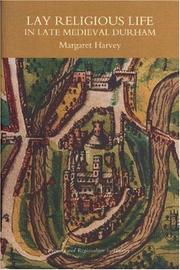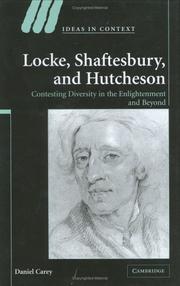| Listing 1 - 2 of 2 |
Sort by
|

ISBN: 1843832771 1846154820 9781846154829 Year: 2006 Publisher: Woodbridge Boydell
Abstract | Keywords | Export | Availability | Bookmark
 Loading...
Loading...Choose an application
- Reference Manager
- EndNote
- RefWorks (Direct export to RefWorks)
Relations between the laity and the religious in medieval Durham reveal much about lay religion of the time. Although religious life in medieval Durham was ruled by its prince bishop and priory, the laity flourished and played a major role in the affairs of the parish, as Margaret Harvey demonstrates. Using a variety of sources, she provides a complete account of its history from the Conquest to the Dissolution of the priory, with a particular emphasis on the fourteenth and fifteenth centuries. She shows how the laity interacted vigorously with both bishop and priory, and the relations between them, with the priory providing schools, hospitals, chantries and regular sermons, but also acting as a disciplinary force. On a wider level, she also looks at the whole question of lay religion and what can be discovered about it. She finishes by an examination of local reactions to the Reformation.
Christian church history --- anno 1200-1499 --- Durham [city] --- Laity --- Church management --- Parishes --- Chantries --- History --- Durham (England) --- Church history. --- Religious life and customs. --- Church polity --- Church administration --- Parish administration --- Parish management --- Management --- Theology, Practical --- Church closures --- Christian laity --- Laymen --- Lay ministry --- Benefices, Ecclesiastical --- Chapels --- Durham, Eng. --- Durham (Durham) --- Medieval Durham. --- Parish history. --- Reformation. --- Religious life. --- History. --- Durham [city in England]

ISBN: 9780521845021 0521845025 9780511490453 9780521117463 0511137214 9780511137211 0511135041 9780511135040 0511490453 1107152046 9781107152045 1280422157 9781280422157 0511183488 9780511183485 0511201435 9780511201431 0511311656 9780511311659 0521117461 Year: 2006 Volume: 74 Publisher: Cambridge, UK ; New York : Cambridge University Press,
Abstract | Keywords | Export | Availability | Bookmark
 Loading...
Loading...Choose an application
- Reference Manager
- EndNote
- RefWorks (Direct export to RefWorks)
Daniel Carey examines afresh the fundamental debate within the Enlightenment about human diversity. Three central figures - Locke, Shaftesbury, and Hutcheson - questioned whether human nature was fragmented by diverse and incommensurable customs and beliefs or unified by shared moral and religious principles. Locke's critique of innate ideas initiated the argument, claiming that no consensus existed in the world about morality or God's existence. Testimony of human difference established this point. His position was disputed by the third Earl of Shaftesbury who reinstated a Stoic account of mankind as inspired by common ethical convictions and an impulse toward the divine. Hutcheson attempted a difficult synthesis of these two opposing figures, respecting Locke's critique while articulating a moral sense that structured human nature. Daniel Carey concludes with an investigation of the relationship between these arguments and contemporary theories, and shows that current conflicting positions reflect long-standing differences that first emerged during the Enlightenment.
General ethics --- Locke, John --- Hutcheson, Francis --- Shaftesbury, of, Anthony A.C. --- Benefices [Ecclesiastical] --- Beneficies [Kerkelijke ] --- Bénéfices ecclésiastiques --- Church benefices --- Enlightenment --- Graces [Expectative] --- Lumières (Philosophie) --- Lumières [Siècle des ] --- Pluralism (Benefices) --- Siècle des Lumières --- Verlichting (Filosofie) --- Enlightenment. --- Pluralism. --- Locke, John, --- Shaftesbury, Anthony Ashley Cooper, --- Hutcheson, Francis, --- Pluralism --- Monadology --- Monism --- Philosophy --- Reality --- Aufklärung --- Eighteenth century --- Philosophy, Modern --- Rationalism --- Anthony, --- Cooper, Anthony Ashley, --- Shaftsbury, Anthony Ashley Cooper, --- Sheftsberi, Ėntoni Ėshli Kuper, --- Shaftesbury, Anthony Ashley Cooper --- Philanthropus, --- Lokk, Dzhon, --- Lūk, Jūn, --- Lo-kʻo, --- Locke, Giovanni, --- Lock, --- Lock, John, --- Rokku, Jon, --- לוק, י׳ון, --- Arts and Humanities --- History
| Listing 1 - 2 of 2 |
Sort by
|

 Search
Search Feedback
Feedback About UniCat
About UniCat  Help
Help News
News